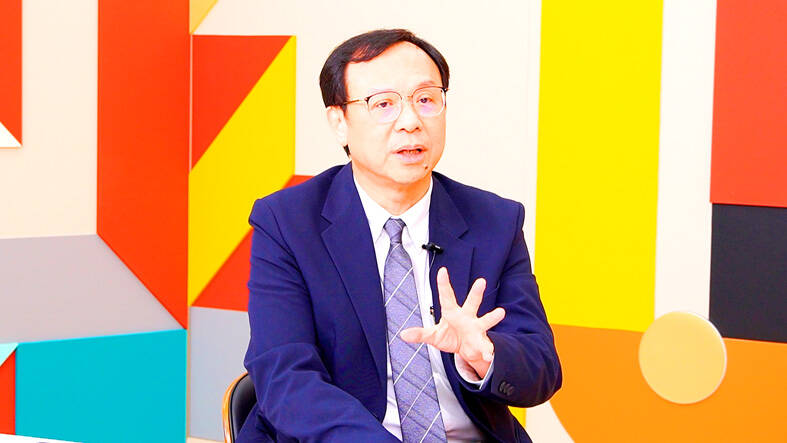The healthcare system is to analyze patient records and family histories using artificial intelligence (AI) to estimate the risk of developing diabetes or hyperlipidemia and improve early diagnoses, National Health Insurance Administration (NHIA) Director-General Shih Chung-liang (石崇良) said in an interview published yesterday.
The government has launched the Home-based Acute Care Program within two months after the inauguration of President William Lai’s (賴清德), in line with his “Healthy Taiwan” policy.
The NHIA has collaborated with Google to use AI to analyze healthcare big data, such as physical examinations, patient records and family histories, Shih said in an interview with the Liberty Times (sister paper of the Taipei Times).

Photo: Chang Chia-juei, Taipei Times
It would help grade the risks of different chronic diseases and predict morbidity rates of stroke or myocardial infarction in the following three to five years, he said.
The “Healthy Taiwan” policy also provides “hospitalization at home” for patients with acute infections, which Lai said would mark a milestone in Taiwan’s history of medicine, Shih said.
Home-based medical services would be used to focus on critical care cases, of which 25 to 30 percent would require hospitalization due to acute infections, Shih said, adding that elderly people living in long-term care facilities are facing similar situations.
The program is to respond to the needs of patients with acute conditions starting from this month, which has long been missing in home care and facility care, he said.
For example, nurses and doctors could visit patients at home or the facility to administer antibiotics when they have pneumonia or infections in their urinary tract or soft tissue, Shih said.
That would reduce the cross infection risk in hospitals and free up beds for other patients in need, thereby avoiding a medical system collapse due to epidemics, he said.
Shih also said the new version of the Rules of Medical Diagnosis and Treatment by Telecommunications (通訊診察治療辦法), which has been implemented from this month, would facilitate home-based acute care, as they have loosened restrictions on applicable users and prescriptions.
Patients’ vital signs could be transmitted to medical facilities via technologies such as wearable devices and smart mattresses for 24/7 monitoring, even though medical practitioners cannot provide bedside services at home, he said, adding that telemedical diagnosis performed by doctors and home visits by nurses would ensure satisfactory services for patients.
In addition to acute care, chronic care has been reinforced as well to include the 5.4 million patients with chronic diseases in Taiwan.
Eighty percent of people aged 65 or older in Taiwan have at least one chronic disease, with diabetes, chronic kidney disease, ischemic heart disease and stroke collectively accounting for about 20 percent, the largest proportion, Shih said, adding that what these chronic diseases have in common are “three highs” — high blood pressure, high blood lipids and high blood sugar.
The government has initiated the “888 project” to include at least 80 percent of people with three highs in the project, while providing them with consultations on their life habits and controlling 80 percent of their three high conditions, he said.

A preclearance service to facilitate entry for people traveling to select airports in Japan would be available from Thursday next week to Feb. 25 at Taiwan Taoyuan International Airport, Taoyuan International Airport Corp (TIAC) said on Tuesday. The service was first made available to Taiwanese travelers throughout the winter vacation of 2024 and during the Lunar New Year holiday. In addition to flights to the Japanese cities of Hakodate, Asahikawa, Akita, Sendai, Niigata, Okayama, Takamatsu, Kumamoto and Kagoshima, the service would be available to travelers to Kobe and Oita. The service can be accessed by passengers of 15 flight routes operated by

GIVE AND TAKE: Blood demand continues to rise each year, while fewer young donors are available due to the nation’s falling birthrate, a doctor said Blood donors can redeem points earned from donations to obtain limited edition Formosan black bear travel mugs, the Kaohsiung Blood Center said yesterday, as it announced a goal of stocking 20,000 units of blood prior to the Lunar New Year. The last month of the lunar year is National Blood Donation Month, when local centers seek to stockpile blood for use during the Lunar New Year holiday. The blood demand in southern Taiwan — including Tainan and Kaohsiung, as well as Chiayi, Pingtung, Penghu and Taitung counties — is about 2,000 units per day, the center said. The donation campaign aims to boost

ENHANCING EFFICIENCY: The apron can accommodate 16 airplanes overnight at Taoyuan airport while work on the third runway continues, the transport minister said A new temporary overnight parking apron at Taiwan Taoyuan International Airport is to start operating on Friday next week to boost operational efficiency while the third runway is being constructed, the Ministry of Transportation and Communications said yesterday. The apron — one of the crucial projects in the construction of the third runway — can accommodate 16 aircraft overnight at the nation’s largest international airport, Minister of Transportation and Communications Chen Shih-kai (陳世凱) told reporters while inspecting the new facility yesterday morning. Aside from providing the airport operator with greater flexibility in aircraft parking during the third runway construction,

American climber Alex Honnold is to attempt a free climb of Taipei 101 today at 9am, with traffic closures around the skyscraper. To accommodate the climb attempt and filming, the Taipei Department of Transportation said traffic controls would be enforced around the Taipei 101 area. If weather conditions delay the climb, the restrictions would be pushed back to tomorrow. Traffic controls would be in place today from 7am to 11am around the Taipei 101 area, the department said. Songzhi Road would be fully closed in both directions between Songlian Road and Xinyi Road Sec 5, it said, adding that bidirectional traffic controls would